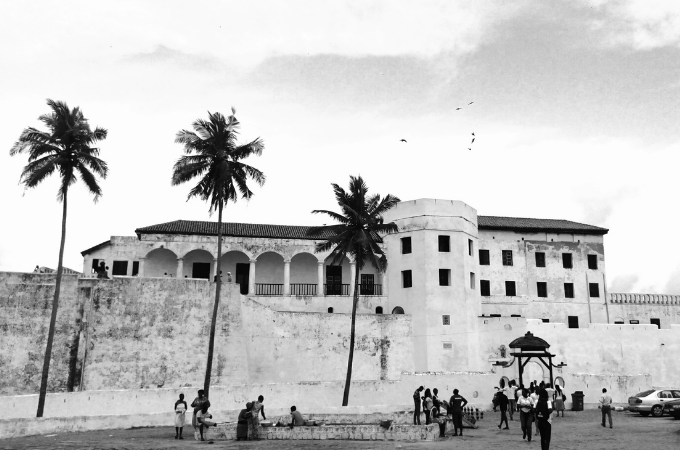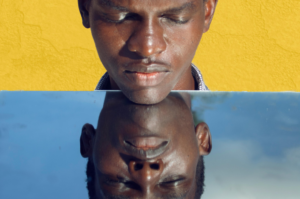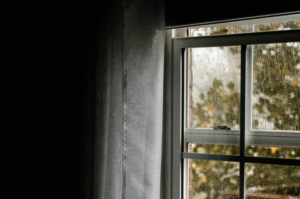
What was once a place of horror turned into a tourist attraction, a landmark branded by a door of no return. Lingering spirits of tortured ancestors existed and breathed within the walls, their deaths a tragedy living in the heart of the country.
Nina followed the tour guide around Elmina Castle, walking freely in a space where her forefathers were shackled and chained. She entered a dungeon that was poorly ventilated, damp, dimly lit, had low ceilings, and was brimming with the presence of souls other than her own. The castle was painted white, but no amount of paint could cover the gloominess roaming within. The pitch-black confinement cells, built for “rebels”, showed a history steeped in misery and atrocities committed against her people.
She recoiled at the sight of footprints and scratches on the concrete and the large rusty canons situated throughout the castle. Other tourists walked past her. Some were horrified, eyes wide open, loud gasps that turned heads, while others looked uncomfortable. Nina quivered at the guide’s retelling of how death didn’t just occur on land, as many perished at sea too in the middle passage. They drowned in the deep blue waters, their final memory filled with turmoil and anguish, left with a sense of helplessness that crushed their already broken hearts.
She moved from the dungeons to the lavish chambers that used to accommodate people responsible for such evil. Their rooms were spacious, built with parquet floors, and the occupants had access to the beautiful scenery of Atlantic waters.
“I can’t believe people were subjected to such horrible conditions while those governors enjoyed the luxuries many craved but never experienced,” she said as the tour moved to a different area.
“That is the chapel where the traders and their families prayed,” the tour guide said.
How ironic, Nina thought. She was certain they didn’t pray for their sins to be forgiven because their actions said otherwise. Perhaps, they prayed for their conscience to be guilt-free, for those held captive to struggle even more each day, and asked for the same mercy they withheld from others.
“So, the captors lived their lives without any consideration of the suffering around them?” Nina asked, and the guide nodded.
Her next stop was Cape Coast Castle, two historical sightings in one day. Like Elmina Castle, the building in Cape Coast was tainted by the dark past of Gold Coast. It was full of memories of those before her who had no autonomy. Both castles weren’t built by royalty, quite the opposite. She couldn’t fathom how the natives were captured, beaten, treated terribly, and forced to live in inhumane conditions for centuries. Even worse, the realisation that foreigners forcibly ruled over a land that was foreign to them sickened her. By the end of the tour, her feet were sore, and her mood had soured. She travelled back to Kumasi and returned home to her family, saddened and enlightened all at once.
“How did you find it?” her mother asked.
“I’m speechless, honestly,” she replied. “For years, I knew our history, but it’s a whole different story to be there in the flesh. I stood in the same spot where thousands of people died. It really did a number on me. I may need some time to recover.”
“You’re not alone. I felt the same way my first visit there,” said her mother. “I just wish they aren’t called castles. A slave castle is an oxymoron. They don’t go in the same sentence. There’s no doubt our ancestors were royalty, but they weren’t treated as such.”
“I agree,” Nina said as she stirred the pot of gravy on the stove. “Of course, it’s important to learn our history, but it’s even more important to never forget it. For me, the tour didn’t end at the castle. It continues as I educate myself on past and present injustices.” Nina poured several cups of rice into the pot and mixed it with the gravy.
Her mother placed marinated chicken thighs onto the grill, turned up the heat, and chopped some onions. “Present injustices?”
“Yes, mum. Don’t you see it on the news daily? Have you forgotten about the racial profiling you experienced on your last trip to the States? We’re still judged by the colour of our skin.”
“Oh, dear. I didn’t forget per se, I just decided to choose to push it to the back of my mind.”
“Exactly, it was very unpleasant. You were targeted and basically treated like a criminal for shopping at a high-end store,” Nina said. “But the mistreatment isn’t just overseas, it happens here too.”
“Yes, I’m aware of the issue of bribery and the mishandling of funds.”
“Not just that, mum. Have you heard of the Awaso bauxite mine or the pollution in Pra River due to mining? Were you aware of the abuse Ghanaian workers faced on trawlers, from beatings to threats, lack of medicine, and long hours?” Nina had read up on how Ghanaian crew members working on trawl vessels were often hit by captains and officers. One man was threatened with a knife, some were deprived of sleep, the contaminated water made many sick, and the low wages did nothing to soothe their suffering.
“I had heard of the mining, but the rest of it is news to me.”
“There’s still a violation of human rights, even in this day and age. It didn’t just end at the castle,” said Nina. “It’s disheartening to see us exploited for our gold and labour.”
“It really is, my dear. But I know all will be well soon.”
They dished the jollof and chicken, had dinner together, and attempted to change the heavy topic at hand. Her history course at KNUST came up, and her mother’s increase in sales at her shop was also discussed. But their conversation earlier occupied a space in her mind that couldn’t be ignored.
That night, she dreamt of a castle, one where chains belonged on keys instead of wrists and ankles. There was no pain, blissful peace reigned, masters didn’t exist, and people weren’t hauled onto ships, stacked on top of each other like sardines. In her dream, freedom didn’t occur in 1957 because Ghana was already free, never enslaved. The streets were lined with gold, kings weren’t overthrown from their thrones, and they didn’t have to fight for what was already theirs. The castles were never built, and the land it occupied was put to better use by the people of Cape Coast. The door of no return disappeared, never constructed in the first place, and no one had to live in fear. Her alarm bell went off, and she squinted at the sunshine peeking through the curtains. It was just a dream, she knew that, but it was enough to make her jump out of bed revitalised and hopeful. Along with her mother, they prayed for healing, understanding, and a nation free of exploitation and united by love.
Photo by Peace Itimi on Unsplash










COMMENTS -
Reader Interactions